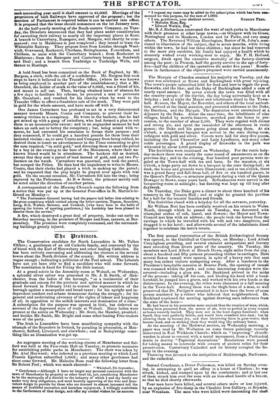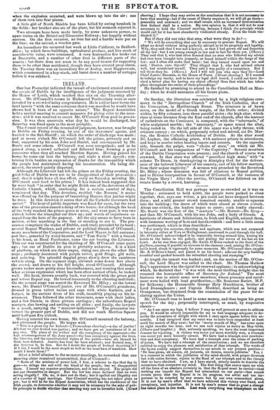Zbe
The Conservative candidate for North Lancashire is Mr. Talbot Clifton ; a gentleman of an old Catholic family, and connected by ties of blood with the Earl of Shrewsbury and other leading Catholics. He has been actively canvassing and addressing the electors at the several towns about the North division of the county. His written address is vague enough ; indicating a politician of the Peel school. The Liberals have not yet been able to find a candidate who will come forward. The nomination is fixed for Friday the 20th instant.
At a grand soirée in the Assembly-room at Walsall, on Wednesday, a splendid silver salver was presented to Mr. J. B. Smith, of Man- chester, from the ladies of the borough, "as a testimonial of their gratitude and esteem for the patriotic and spirited manner in which he stood forward in February 1841 to contest the representation of the borough against a monopolist and bread-taxer ; for his upright and in- dependent conduct and urbane demeanour during the struggle ; for his general and undeviating advocacy of the rights of labour and happiness of all, in opposition to the selfish interests and domination of a class." A subscription for the purpose was opened in 1841, but deferred on account of the depressed state of trade at Walsall. Many ladies were present at the soirée on Wednesday ; Mr. Scott, the Member, presided ; and besides Mr. Smith, Mr. Bright and some other leading Free-traders were of the party.
The Irish in Lancashire have been manifesting sympathy with the triumph of the Repealers in Ireland, by parading in procession, at Man- chester, Salford, Liverpool, and elsewhere ; and at Staleybridge some- thing like an illumination was got up.
An aggregate meeting of the working-classes of Manchester and Sal- ford was held at the Free-trade Hall on Tuesday, to promote measures for establishing public parks in Manchester. The chair was taken by Mr. Abel Heywood ; who referred to a previous meeting at which Lord Francis Egerton subscribed 1,0001.; and many other gentlemen had since come forward. Mr. Malcolm Rose read the following letter from Sir Robert Peel ; which was much cheered—
Whitehall. 7th September.
"Gentlemen—Although I have no longer any personal connexion with the town of Manchester by property or other local tie, yet, considering Manchester to be the metropolis of a district to the industry of which land my family are under very deep obligations, and most heartily approving of the wise and bene- volent design to provide for those who are doomed to almost incessant toil the means of healthful recreation and harmless enjoyment, I willingly contribute to the furtherance of that design, and offer my cordial wishes for its success. "I request my name may be added to the subscription which has been com- menced for this purpose, for the sum of 1,0001.
"I am, gentlemen, Lair obedient servant, ROBERT PEEL.
g. Malcolm Rose, .
"Edward Watkin, sq."
Mr. R. J. Richardson contrasted the want of such parks in Manchester with their presence at other large towns,—as Glasgow with its Green, Nottingham and its Meadows, London and its Parks, and very many others. The Reverend William Huntington, Rector of St. John's, men- tioned in illustration of the subject, that in seven months, while living within the town, he had lost three children ; but since he had removed to the more airy outskirts, his family had enjoyed a health which he sincerely wished every working-man to enjoy. Mr. P. H. Holland, surgeon, dwelt upon the excessive mortality of the factory-districts among the poor : in Preston, half the gentry survive to the age of forty- five—half the children of the operatives die under five years! Resolu- tions in furtherance of the objects proposed were carried unanimously.
The Marquis of Chandos attained his majority on Tuesday, and the event was celebrated at Stowe and Buckingham with great rejoicing. The town's-people subscribed 2001. for food and beer to regale the poor, fireworks, and the like ; and the Duke of Buckingham added a sum of nearly equal amount. By seven o'clock the town was filled with all the country-people of the district, the day being universally kept as a holyday ; and at night the Mayor and inhabitants dined in the Town— hall. At noon, the Mayor, the Recorder, and others of the local authori- ties, arrived at the ducal mansion, and presented addresses to the Doke, the Dutchess, and the Marquis. The deputation were entertained at a dejenner by the Duke. About the same time, the inhabitants of nine villages, headed by morris-dancers, marched past the house in pro- cession, to the number of about 2,500. They were regaled with dinner and strong ale, and spent the remainder of the afternoon in rustic games ; the Duke and his guests going about among them. At six o'clock, a magnificent banquet was served in the state dining-room, refulgent with gold and silver. Covers were laid for sixty-five guests, including the Lord Chancellor and Lady Lyndhurst, and many other noble personages. A grand display of fireworks in the park was witnessed by about 5,000 persons.
The festivities were continued on Wednesday. For the rustic holy- day-makers there was nearly the same round of amusements as on the previous day ; and in the evening, four hundred poor persons were re- galed at the Town-hall with tea and buns. In the mansion, at six o'clock, a large party sat down to a banquet in the state dining-hall ; at dusk, the house and grounds were illuminated ; and at ten o'clock, there was a grand fancy and fall-dress ball, of five or six hundred guests, in the Queen's Pavilion,—a structure prepared during a visit of the Queen Dowager to Stowe, some years back. Refreshments were served in the banqueting-room at midnight ; but dancing was kept up till long after daybreak. On Thursday, the Duke gave a dinner to about three hundred of his tenantry in the Tenants Hall ; and at night he granted the pavilion for a ball for the tenants' families and friends.
The festivities closed with a holyday for all the servants, yesterday.
Sir William Nott has been cordially received on his return to Wales. Neath, through which he passed on Tuesday, was decorated with triumphal arches of oak, lame!, and flowers ; the Mayor and Tows- Council met him with an address ; the people took the horses from the carriage in which he travelled with his wife and two daughters, and dragged it to his hotel ; and afterwards several of the inhabitants dined together to celebrate the hero's return.
The first annual convocation of the British Archmological Society was opened, in the Guildhall at Canterbury, on Monday ; Lord Albert Conyngham presiding, and several eminent antiquarians and literary men attending from divers parts of the country. On Tuesday, the members met Lord Albert at Breach Down, eight miles from the city ; about a hundred and fifty persons proceeding thither in carriages. Here several Saxon tumuli were opened, in spite of a heavy rain that sent many less ardent visitors scampering away. After a luncheon in the
President's hospitable mansion at Bourne Park, the opening of tumuli was resumed within the park ; and some interesting remains were dis-
covered—including a glass urn. Dr. Buckland arrived in the midst
of the process : taking off his coat, and binding his head with a hand- kerchief, he jumped into a grave, and worked with his own hands at the disinterment. In the evening, the relics were discussed at a full meeting
in the Town-hal Among them was the thigh-bone of a man, so well preserved that Dr. Pettigrew surmised it to have been the bone of some
person murdered by a robber who infested that neighbourhood. Dr. Bucklaud cautioned the meeting against drawing such inferences from the state of the bone— He had bones in hie possession more ancient than the creation of man, which, having been preserved from the access of air, were as perfect in every respect as bones recently buried. They were not in the least degree fossilized: when found, they were perfectly brittle, and would have crumbled into dust ; but by allowing them to become dry, and then immersing them in gum-water, they became hard, and on striking them they would ring like ordinary bones.
At the meeting of the Medimval section, on Wednesday morning, a paper was read by Mr. Wollaston on some fresco paintings recently
discovered in East Wickham Church ; which an "improving" church- warden is about to conceal with a mural monument, from a Puritanical desire to destroy " Papistical decorations." Resolutions were passed for taking means to intercede with owners of ancient relics for their preservation. Canterbury Cathedral aud its history occupied the So- ciety in the evening. Thursday was devoted to the antiquities of Richborough, Barfreston, and the cathedral.
Samuel Coachman, a Dover Policeman, was killed on Sunday even- ing, in attempting to quell an affray in a house at Charlton : he was struck, kicked, and stamped upon by the combatants; and at last one of them struck him over the nose with an iron-shod handle of a broom, so that he died shortly afterwards.
Four men have been killed, and several others more or less injured, by an explosion of fire-damp in the Cheshire Iron Colliery, at Brymbo, near Wrexham. The men who were killed were descending the alma when the explosion occurred, and were blown up into the air ; one of them torn into four pieces.
A little girl of North Shields has been killed by eating hemlock in the fields : her brother also ate of the plant, but his stomach rejected it.
Two attempts have been made lately, by some unknown person, to upset trains on the Bristol and Gloucester Railway; but happily without success. On the first occasion, an iron bar and a hurdle were put on the line ; on the second, a wooden gate.
An incendiary fire occurred last week at Little Caldicott, in Bedford- shire : by which farm-buildings, agricultural produce, and live stock of considerable value, were consumed. A very destructive fire broke out at Dunstable, and a number of other fires in different parts of the county ; hut there does not seem to be any good reason for supposing them to be other than accidental, though they have created great alarm. On Tuesday there was an incendiary fire at Arsley, near Biggleswade, -which commenced in a hay-stack, and burnt down a number of cottages before it was subdued.



























 Previous page
Previous page